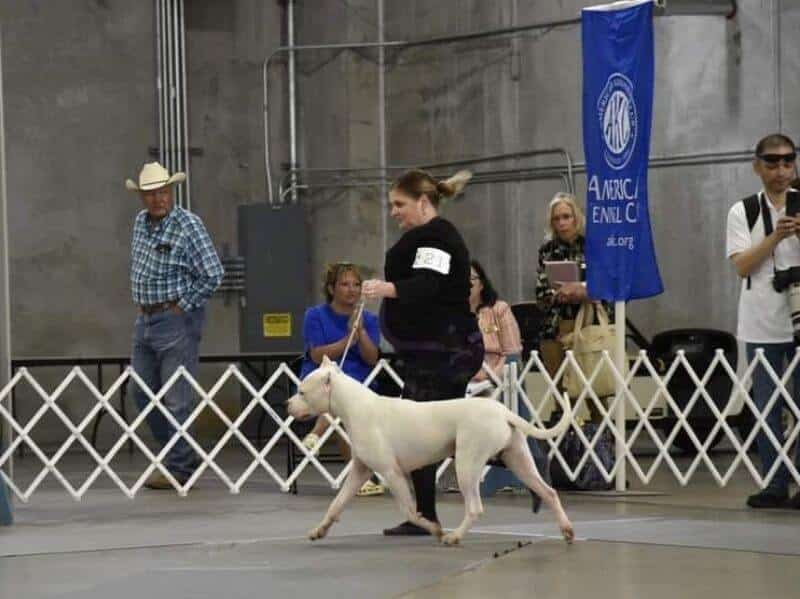Interview with Amy Collins, Breeder of Polleo Dogo Argentino
Where do I live? How many years in dogs? How many years as a breeder?
Amy Collins: I live in Ohio. I have been in dogs all of my life, but with the for 23 years. I started breeding in 2007.
What is my kennel name? How many dogs do I currently keep?
Amy Collins: My kennel name is Polleō [‘pol.le.o:] Dogo Argentino. It is derived from Latin, meaning powerful and/or strong. I have three males and six females.
Which show dogs from the past have been my noteworthy winners?
Amy Collins: My top-winning dog was an import from Argentina and the base stud of my program: DACA GCH NAKC Master Supreme International GCH Exodus de Argentum CGC. He taught me what a true Dogo Argentino should be in the field and show ring. He lived for 13 years. I have up-and-coming dogs that I am excited to work with.
Which have been my most influential sires and dams?
Amy Collins: There are many, but to mention a few:
- Exodus de Argentum,
- Audacity Princess,
- Xuxa de Los Quilmes,
- Brix de La Bellator,
- Bai de Los Polleo,
- Aala de Los Polleo,
- Indi de Los Gran Guerrero, and
- Lola de Los Polleo.
Can I talk a bit about my facilities? Where are my puppies whelped? How are they raised?
Amy Collins: Of course! My husband, Beau, and I run our kennels. Everything in our daily lives revolves around our dogs. Puppies are whelped either in our home or in our puppy whelping indoor/outdoor 20×20 building. It is temperature-controlled and comfortable for dam and pups, as well as us. We spend the first week with the dam and litter, sometimes sleeping in the whelping box. My husband and I are very hands-on 24/7 for the first three weeks of their lives. Our puppies are exposed to many things such as noise, texture, and people to test their drive as well as gauge their biddability. Establishing this foundation early-on is key.
It starts with the parents; they must be genetically stable. If not, they shouldn’t be bred. We try to produce a well-rounded and socialized puppy before it leaves our home. We use a modified version of the Wendy Volhard’s Puppy Aptitude Test, Puppy Culture, and our own methods that have worked for us. Having stable temperaments in this breed is important. We introduce our puppies early on to other dogs and breeds that we own so that they can run and play as a pack. Our Jack Russell, “BlackJack,” is the best puppy sitter. This is essential to develop the pack mentality so that there is sociability with other dogs in the future. They need to know that it is okay to be around strange dogs, be it in the show ring or in the field hunting with a new pack.
What is my “process” for selecting Show Puppies? Performance Puppies?
Amy Collins: The Dogo Argentino should be ONE and have all attributes to do what it is bred to do. Not every puppy in the litter will excel in that avenue. When I am selecting a puppy, I look for TYPE. Will the puppy check all (or close to all) the boxes of the Breed Standard? I also look for the puppy that is outgoing, not shy. To us, there is a difference between being shy and quiet dominant. A quiet dominant puppy is one that is confident and doesn’t look for trouble, but will step up to any challenge when it needs to. My husband and I work well together when making selections.
Do I compete in Performance Events? In Parent Club Tests & Trials?
Amy Collins: Yes, I compete in Parent Club Events and recently started Performance Events a couple of years ago. I am still very novice. I have tried Fast CAT and Dock Diving, and I intend to give Barn Hunting and Farm Dog a try in the future.
Is “performance” part of my decision-making when it comes to breeding?
Amy Collins: Absolutely. When I think of performance, I first equate it as hunting in the field as the Dogo Argentino was bred to do. That is a very important aspect of our program. With AKC Performance Events, this is something that I am newer to and I enjoy seeing the dogs work as they should.
How would I define “conditioning” as it relates to my breed?
Amy Collins: The Dogo Argentino should be conditioned to be able to do the job it was bred to do. This means, when you look at the dog, it should be able to run for miles to catch and hold the wild boar until the hunter arrives to quickly dispatch it. It takes sheer power to be able to handle such a magnificent creature as the wild boar.
The wild boar is a very intelligent, evasive species and the Dogo Argentino must surpass that intelligence. The Dogo Argentino should have well-developed muscles and substantial bone. It must also have a deep chest for the lung compacity to run for miles in the field. The head is the most important stamp of the breed. The wide nostrils and tight-lipped mouth, with just enough commissure to breath while holding the wild boar, is essential. Without all of this, a non-conditioned dog would fail at the task.
Are there any health-related concerns in my breed? Any special nutritional needs?
Amy Collins: Yes, there is deafness. We are required to BAER (Brainstem Auditory Evoked Response) test all breeding stock and litters. Hips and Cardiac are equally important. A healthy, balanced diet with plenty of protein is best. We mostly feed a raw diet and add supplements.
Do I think my breed is supported by a sufficient number of preservation breeders?
Amy Collins: Unfortunately, there are very few here in the United States.
Is my breed well suited to be a family dog? Who are the best candidates to own my breed?
Amy Collins: With the correct temperament and continued training, yes it can be well suited to be a family dog. The Dogo Argentino needs a job; without it they can become very destructive. The breed is not for everyone. There are so many new people selling the breed without the proper vetting. The best candidate is someone who has done their research and seeks out a mentor in the breed (not a fly-by-night breeder), someone who has dedicated their lives to the breed and cares about the preservation of the breed. A candidate who will stay in contact with their breeder and/or mentor for the life of the dog. Someone who is willing to join the parent club and become active with the community. A candidate who is willing to put in the work is the ideal person for ownership.
What is the biggest misconception about my breed? What is my breed’s best-kept secret?
Amy Collins: There are a couple misconceptions! That they do not shed and that they are meant to be couch potatoes. Best-kept secret? I am not telling, LOL. Then, it wouldn’t be a secret.
If I could share a comment or two with judges of my breed, what would I like to say to them?
Amy Collins: Always choose type over flashy. The Dogo Argentino should not be a flashy dog in the ring. It should be serious with a look of marked hardness. Also, approach the dog from the front; head first, then go over the body. You want to introduce yourself as a friend, not a stranger.
Do I have any words of wisdom to pass along to newer breeders?
Amy Collins: Find a good mentor! Join the parent club!! Do not try to figure it out yourself. There are those who have been there and done that, so learn from their experience. Read and understand the Breed Standard before selecting your breeding stock.
For a bit of fun, what’s the most amusing thing I’ve ever experienced with a Working Dog?
Amy Collins: I never get tired of watching a happy Dogo Argentino do zoomies! But the most amazing experience is watching the breed do what it was originally bred to do, and that is to hunt.








